Learning from Gambia’s COVID-19 response and its impact on marginalized groups

The Gambian Government rolled out a range of measures, from lockdowns to humanitarian relief packages, in response to COVID-19 once the first case was confirmed in the country in March 2020. But how has the implementation of the nation’s COVID-19 response impacted the lives and livelihoods of the more vulnerable people in The Gambia, specifically persons with disabilities (PWDs) and women?
This was the focus of a series of national dialogues in The Gambia organised by Westminster Foundation for Democracy (WFD) in partnership with the British High Commission (BHC). The national dialogues, which were held over three meetings between October and November 2020, provided an environment for open and constructive engagement with representatives from PWDs and women.
WFD and the BHC commissioned a report to present an account of the participants during the national dialogues under the theme: Learning from Gambia’s response to COVID-19: Lessons, Successes and Challenges.
Participating organizations that contributed to the report include disabled persons organizations (DPOs); civil society organizations (CSOs), particularly those working on women’s rights; and representatives from key government offices such as government ministries and the National Assembly.
Some key themes emerged from the discussions: first, how the lack of inclusivity in design of policy interventions and implementation led to marginalised groups being inadvertently ignored or poorly served; second, how some of the Government’s active responses to COVID-19 had a greater and harder impact on marginalised groups; and third, how some specific negative consequences for marginalised groups of COVID-19 still require more direct government intervention.
The report seeks to present the captured insights and viewpoints of the participants to the Gambian government and relevant stakeholders.